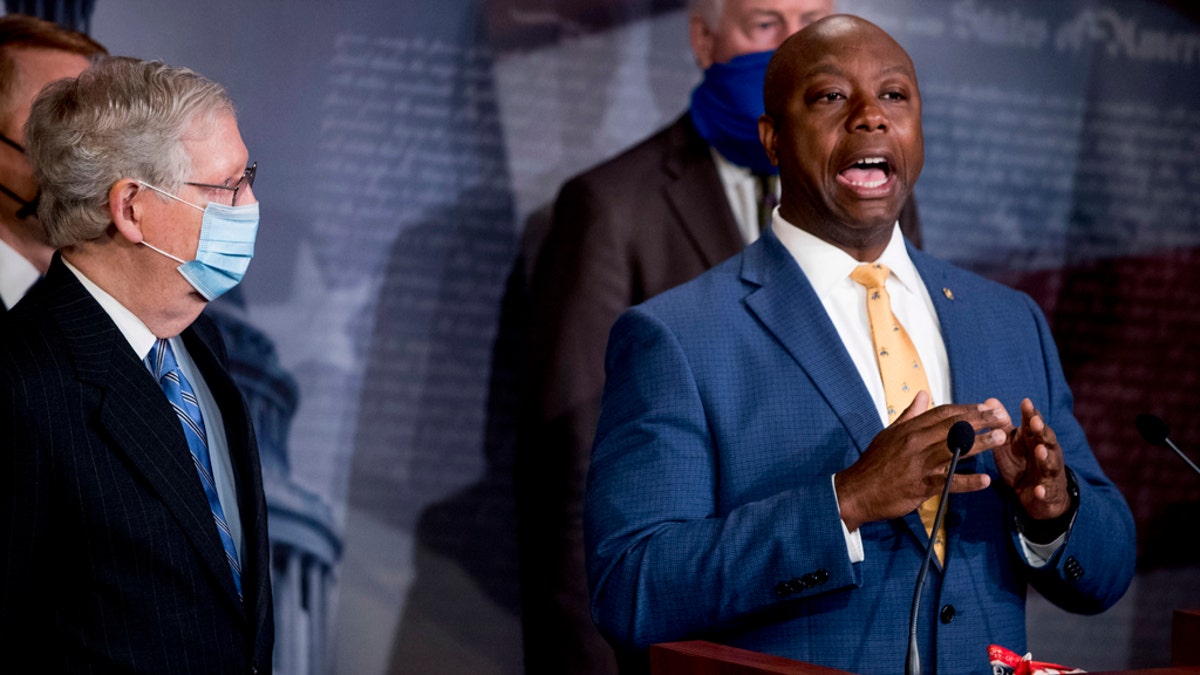Senate Republicans, led by Sen. Tim Scott, unveil police reform bill
Republican Sen. Tim Scott and Senate leaders announce the JUSTICE Act on Capitol Hill.
Senate Republicans on Wednesday unveiled their "Justice Act" police reform legislation to hold officers accountable with an enhanced use-of-force database, pursue restrictions on chokeholds and create new commissions to study law enforcement and race.
Sen. Tim Scott, the lone African-American GOP senator, spearheaded the legislation in the wake of George Floyd's death and nationwide protests demanding racial justice -- including activists' calls to dismantle police departments. He framed the legislation as a bridge between law enforcement and communities of color.
SENATE DEMOCRATS RIP GOP POLICE REFORM BILL EVEN BEFORE PLAN UNVEILED
"The answer to the question of which side do you support is 'I support America,'" Scott, R-S.C. said, "And if you support America you support restoring the confidence that communities of color have in institutions of authority. If you support America, that means you know that the overwhelming number of officers in this nation want to do their job, go home to their family. It is not a binary choice. This legislation encompasses that spirit."
Scott said the overwhelming number of officers in America are good people. But he acknowledged the real fears people of color have about encountering the police.
"We hear you. We're listening to your concerns," said Scott, who recalled his own "driving while black" experiences of being stopped seven times in one year. "The George Floyd incident certainly accelerated this conversation."

Sen. Tim Scott, R-S.C., right, accompanied by Senate Majority Leader Mitch McConnell of Ky., left, Sen. John Cornyn, R-Texas, center, and others, speaks at a news conference to announce a Republican police reform bill on Capitol Hill, Wednesday, June 17, 2020, in Washington. (AP Photo/Andrew Harnik)
Scott was joined by Senate Majority Leader Mitch McConnell, R-Ky., Sens. Shelley Moore Capito, R-W.Va., John Cornyn, R-Texas, Lindsey Graham, R-S.C., James Lankford, R-Okla. and Ben Sasse, R-Neb. to unveil the 106-page legislation. The package of reforms is called the Just and Unifying Solutions to Invigorate Communities Everywhere (JUSTICE) Act.
McConnell said he'll bring the legislation to a vote on the Senate floor by next week. "We're serious about making a law here," he said at the Capitol press conference.
Democrats have already unveiled their police reform legislation that's called the Justice in Policing Act. That legislation would lower the bar for police officers to face criminal prosecution by allowing charges not just in cases where alleged misconduct was intentional, but also in cases of reckless misconduct. It would also ban chokeholds, create a national database of cops who committed misconduct, boost police training and reform qualified immunity that can protect cops from lawsuits from victims of police brutality.
Scott's bill doesn't ban chokeholds outright and doesn't end qualified immunity. Democrats have already panned the legislation as not going far enough.
"The Senate proposal of studies and reporting without transparency and accountability is inadequate," House Speaker Nancy Pelosi said of the GOP legislation. "The Senate’s so-called Justice Act is not action."
The GOP legislation would beef up requirements for law enforcement to compile use of force reports under a new George Floyd and Walter Scott Notification Act, named for the Minnesota father whose May 25 death sparked worldwide protests over police violence, and Scott, the South Carolina man shot by police after a traffic stop in 2015, no relation to the senator.
It would also establish the Breonna Taylor Notification Act to track “no-knock” warrants. Such warrants used to be rare, but the 26-year-old was killed after police in Kentucky used a no-knock warrant to enter her Louisville home.
To focus on ending chokeholds, it encourages agencies to do away with the practice or risk losing federal funds. Many big-city departments have long stopped their use. It also provides funding for training to “de-escalate” situations and establish a “duty to intervene” protocol to prevent excessive force.
SEN. TOM COTTON INTRODUCES BILL TO GIVE CASH REWARDS TO GOOD COPS
But the GOP effort seeks to reach across the aisle to Democrats in several ways. It includes one long-sought measure to make lynching a federal hate crime and another to launch a study of the social status of black men and boys that has been touted by Pelosi.

Senate Majority Leader Mitch McConnell of Ky., left, and Sen. Tim Scott, R-S.C., right, arrive at a news conference to announce a Republican police reform bill on Capitol Hill, Wednesday, June 17, 2020, in Washington. (AP Photo/Andrew Harnik)
The Republican package also includes a bipartisan Senate proposal to establish a National Criminal Justice Commission Act and extends funding streams for various federal law enforcement programs, including the COPS program important to states.
The package includes a mix of other proposals, including tapping the Smithsonian’s National Museum of African American History and Culture to create a law enforcement training curriculum on “the history of racism in the United States.” Another closes a loophole to prohibit federal law enforcement officers from engaging in sexual acts with those being arrested or in custody.
The Associated Press contributed to this report.





